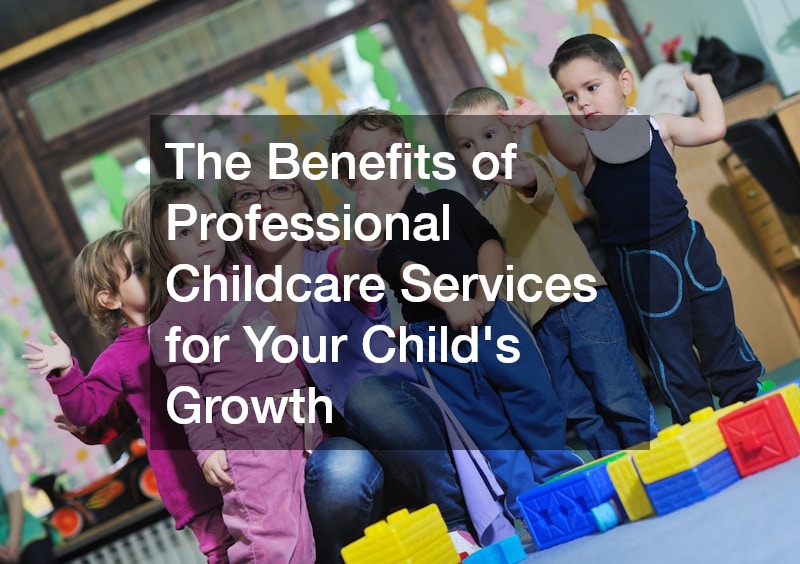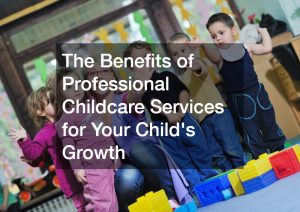Raising a child is one of the most rewarding experiences in life, but it also comes with significant challenges. Parents want the best for their children, from nurturing emotional development to fostering cognitive skills. Professional childcare services play a pivotal role in supporting this growth, offering a structured environment where children can thrive. Beyond simply providing supervision, these services help cultivate social skills, creativity, and independence, forming a strong foundation for lifelong learning and well-being.
Structured Learning Environment
One of the primary advantages of professional childcare services is the structured learning environment they provide. Unlike informal caregiving, professional centers design activities and schedules that stimulate children’s intellectual and emotional growth. Age-appropriate lessons, guided play, and educational routines help children develop essential cognitive skills, including problem-solving, critical thinking, and language acquisition. A structured environment also introduces children to the concept of routine and discipline, which fosters a sense of security and prepares them for future academic settings. This consistency allows children to feel confident exploring new ideas and challenges within a supportive framework.
Additionally, professional caregivers are trained to observe and support developmental milestones. By recognizing early signs of learning difficulties or behavioral challenges, they can implement strategies to address these issues promptly. This proactive approach ensures that each child receives the support they need to reach their full potential while enjoying a safe and nurturing environment. Moreover, caregivers can tailor activities to each child’s unique strengths and needs, promoting personalized growth.
Social and Emotional Development
Another key benefit of professional childcare services is the emphasis on social and emotional development. Interacting with peers in a structured setting helps children learn essential interpersonal skills, such as cooperation, sharing, and empathy. They discover how to navigate conflicts, express their emotions constructively, and develop meaningful friendships. These experiences help children develop a strong sense of belonging and understanding of diverse perspectives.
Professional caregivers also provide consistent emotional support, helping children build self-confidence and resilience. These early experiences of emotional regulation and social interaction can significantly impact a child’s ability to form positive relationships in later life. Children who attend professional childcare often exhibit stronger communication skills and a greater sense of independence, both of which contribute to overall well-being and success in school and beyond. With this guidance, children are better prepared to handle challenges and transitions as they grow.
Physical Growth and Health
Physical development is another area where professional childcare services make a significant impact. High-quality centers incorporate structured physical activities, outdoor play, and nutritious meals into their daily routines. These practices help children develop motor skills, maintain a healthy weight, and adopt positive habits that support lifelong wellness. Regular physical activity also improves coordination, stamina and promotes healthy brain development.
Furthermore, professional caregivers are trained in safety and hygiene practices, reducing the risk of illness and injury. This combination of active play, proper nutrition, and health education encourages children to embrace a healthy lifestyle from an early age. Over time, these habits not only improve physical growth but also enhance mental well-being, as active children tend to demonstrate better focus, energy levels, and overall mood. Parents can rest assured that their children are developing healthy habits in a safe and supportive environment.
Parental Support and Peace of Mind
In addition to the direct benefits for children, professional childcare services also provide essential support for parents. Knowing that their child is in a safe, nurturing, and stimulating environment allows parents to focus on their work, personal goals, and family responsibilities without constant worry. This peace of mind reduces stress and fosters a healthier family dynamic. The collaboration between caregivers and parents also encourages a consistent approach to discipline and learning, benefiting the child’s overall development.
Professional childcare centers often maintain open lines of communication with parents, providing updates on developmental progress, milestones, and daily activities. This collaboration helps parents stay informed and involved, reinforcing the learning and growth occurring at the center. Ultimately, professional childcare services create a partnership between caregivers and families, ensuring that children receive consistent support both at home and in a structured learning environment.
Professional childcare services offer far more than basic supervision—they are a catalyst for a child’s overall growth and development. From providing structured learning environments and promoting social-emotional skills to supporting physical health and giving parents peace of mind, these services play a crucial role in shaping well-rounded, confident, and capable children. By investing in high-quality childcare, parents can help their children thrive academically, socially, and emotionally, laying the groundwork for a successful and fulfilling future.








